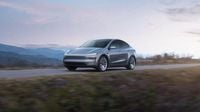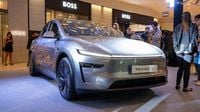Tesla's sales in Europe have plummeted dramatically, with recent data from Jato Dynamics revealing a staggering 45% decline in February 2025. This downturn has resulted in the company's lowest market share in five years, dipping to 9.6%. Once the undisputed leader in electric vehicles (EVs), Tesla now finds itself overshadowed by competitors, including Volkswagen and several Chinese automakers.
In February, Tesla managed to sell fewer than 16,000 vehicles across key European markets such as the UK, Norway, and Switzerland. This decline comes at a time when the overall European EV market is experiencing a robust growth of 25%, with other brands capitalizing on Tesla's missteps. For instance, Volkswagen's electric vehicle sales surged by 180%, reaching nearly 20,000 units, while the BMW Group, which includes Mini, sold just under 19,000 BEVs.
Notably, BYD, a Chinese manufacturer, recorded a remarkable 94% increase in sales, moving over 4,000 electric vehicles in February. Polestar, another rising name in the EV sector, also celebrated an 84% increase, delivering more than 2,000 units. Additionally, newer entrants like Xpeng and Leapmotor have made their mark, selling approximately 1,000 and nearly 900 vehicles, respectively.
Industry analysts suggest that Tesla's struggles can be attributed to several factors, including its aging model lineup. Many potential buyers are reportedly holding out for the updated Model Y, which is expected to launch soon. Felipe Munoz, a global analyst at Jato Dynamics, noted, "Brands like Tesla, which have a relatively limited model lineup, are particularly vulnerable to registration declines when undertaking a model changeover." This sentiment is echoed by Ahmad Assiri, a research strategist at Pepperstone, who highlighted that CEO Elon Musk's political affiliations have also negatively impacted Tesla's reputation among significant consumer segments.
Musk's controversial political endeavors, particularly his association with right-wing parties, have alienated a portion of Tesla's customer base. Assiri stated that these political connections are making BYD increasingly appealing to both consumers and investors. As Tesla faces backlash, protests at dealerships have become more common, with reports of vandalism against Tesla vehicles surfacing.
In the U.S., Tesla is not faring much better. The company saw an 11% drop in deliveries in January 2025, although it still holds a dominant position in the American market, accounting for about 42% of total EV sales. However, analysts warn that the competition is intensifying, with numerous automakers now producing high-quality electric vehicles.
Despite the challenges, Tesla's latest models, including the updated Model 3 and Model Y, are being hailed as some of the best electric vehicles available. The Launch Edition of the Model Y is priced at £60,990 in the UK and $52,490 in the U.S., which may deter some buyers who are waiting for more affordable variants expected to arrive later this summer. This situation has led to a cyclical pattern in Tesla's sales, with peaks and troughs influenced by pricing strategies and consumer sentiment.
As the year progresses, all eyes will be on Tesla to see if the anticipated Model Y lineup can rejuvenate sales. The upcoming months will be crucial for the company, as it navigates a landscape filled with fierce competition and shifting consumer attitudes. If sales do not improve following the launch of the new models, Tesla may need to reassess its strategies and address the growing concerns surrounding its brand image.
While Tesla was once the go-to name for electric vehicles, the market is evolving rapidly. With more automakers entering the space and offering compelling alternatives, the pressure is on for Tesla to maintain its relevance in an increasingly crowded field. The company's future will depend not only on its product offerings but also on how it addresses the public's perception of its leadership and political affiliations.





